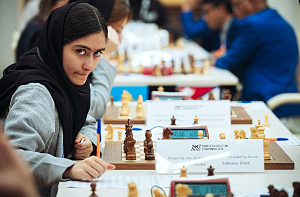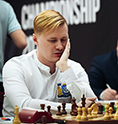A Pale Effort
Superfinals, round 2. Misha Savinov reports from St. Petersburg
The second round of the men's Superfinal brought three decisive games, all won by Black, and all the outcomes were basically decided by the 22nd move. White looked pale in those – a blunder, a four-step suicide, and an opening disaster. Also, two of those games were played between potential title contenders and will have a lasting impact on the tournament dynamics.
White could strike back in one of other games, but missed a forced endgame victory in the time trouble. Thus, 0-3 for White today. Perhaps the Civil War posters are affecting the players on a subconscious level.
Round 2, men
Svidler-Dubov 0-1, Tomashevsky-Fedoseev 0-1, Inarkiev-Volkov ½-½, Sjugirov-Matlakov ½-½, Romanov-Vitiugov 0-1, Riazantsev-Malakhov ½-½.
Peter Svidler vs. Daniil Dubov
The headline of the round. Yesterday I heard an opinion that the ideal outcome of the championship would be a tie-break between Svidler and Dubov – a perfect balance between the two Russian capitals – and the two chess generations as well, with a rapid chess cherry on top. So the today's game could serve as a rehearsal, or perhaps a probe – strong performance against the powerful Svidler could tell whether Dubov is actually capable of challenging the title. Of course, on this level White usually can avoid the battle and wrap up a draw if he wants to, but playing this way would be the testimony of poverty, plus Peter does not like to ruin the show.
All in all, this led to a depressingly washy performance by the 7-time Russian champion. The skill of his young opponent was not really tested, aside from his ability to make logical moves and convert scoring chances clinically. White's sequence of moves from #13 to #19 cost him more than 2/3 of the allocated time and ruined his position altogether. This was a chess nightmare. None of it was necessary – White had safer alternatives on each of these moves, he just could not decide whether he wants safety or fight.
“When Peter took on f4 with a pawn, I was sort of shocked. Even if the move was not as bad as I thought, it surely was sharp and complicated, and playing stuff like that with 20 minutes for 21 move is usually a bad idea”, commented Daniil Dubov afterwards.
White's 23.c5 four moves later already looked like fighting fire with gasoline, but as Peter pointed out, this was the only setup that could do White any good in the long run – provided it did not lose on the spot. But it did lose, and Daniil duly demonstrated it on the board.
In two rounds of his third Superfinal, the Muscovite already won twice as many games as in the previous two tournaments combined, and tomorrow he has White against the lowest rated participant of the Superfinal. Should we expect three out of three?
Evgeny Tomashevsky vs. Vladimir Fedoseev
Having defeated the 2016 champion Alexander Riazantsev yesterday, today the young St. Petersburg grandmaster faced the 2015 champion Evgeny Tomashevsky and got an unexpectedly easy victory with black pieces.
“Finally I managed to recall more than 10 moves in the opening”, happily said Vladimir Fedoseev after the game. “Not sure at what point my opponent started playing on his own. I have a feeling he was already out of book by the move 12. He reacted to my setup in the very principled way, but unfortunately for him his line had a direct refutation, which I showed in the game. Black won material, and White did not get much in return.”
The move Fedoseev talks about is a daring push of the g-pawn, which weakened the Black's king severely, but in turn attacked the white knight. White's most natural reaction would be leaving his knight en prise while bringing the queen's rook into the battle along the 3rd rank. However, after some thought Tomashevsky wisely avoided what looked like a deep opening preparation of his opponent. White's attack was indeed leading nowhere, as Fedoseev showed the audience afterwards. In the game Tomashevsky retreated the knight, giving Black a very comfortable game, then gave up a pawn, seeking active play. However, White's activity was not sufficient, and after his hasty push of the f-pawn the game basically entered a technical phase. Fedoseev skilfully converted an extra pawn, forcing the resignation on the 42nd move.
Thus, after the first two rounds he also maintains the perfect score. I guess it is time to check when Fedoseev is to play Dubov (round 8, December 11) and what color does he have (White).
Ernesto Inarkiev vs. Sergey Volkov
Ernesto Inarkiev clearly wanted to erase memories of his endless first round suffering in the most ferocious way. He quickly and confidently pushed all the kingside pawns against Volkov's favorite French. Black's only hope was a swift counterattack on the queenside. The critical moment arose on the 16th move. After a lengthy thought, Ernesto chose a move, which allowed Volkov to deliver a counterblow in the center, sacrificing a pawn. White had no choice but to accept it, but then a quiet queen move followed, forcing a nice drawing finale – White grabs two black rooks for his queen, but Black survives with a nice perpetual. Ernesto thought for good 20 minutes, exhausting all the options, but there was no alternative.
After the game the players analyzed its critical position for almost an hour in the press room, exploring more aggressive options for White. Black got mated in many variations and succeeded in many other with his counterattack. A prolific writer could compose a whole book on tactics in the French Defense based solely on this postmortem.
The conclusion was:
“One needs to study the French deeper!” – Sergey Volkov.
“A direct attack does not seem to work. Strange...” – Ernesto Inarkiev.
Sanan Sjugirov vs. Maxim Matlakov
Facing 1.e4, Black went for the the Ruy Lopez, but avoided the Berlin, so the careless move of the king's pawn wasn't really challenged. The first conflict occurred rather early (by standards of this slow-paced opening anyway) and annihilated most of the queenside. Sjugirov, sensing that his advantage is about to evaporate, went for a tricky trap, and Matlakov almost fell for it, but discovered a forced win for White while double-checking the prepared move (26...Rb4? 27.Bxh7+, etc). After a correct reply by Black, a rook ending emerged, and it was drawn despite Black's minimal material advantage.
Evgeny Romanov vs. Nikita Vitiugov
The game developed in a slow pace for a while, but in the early middlegame Romanov dramatically overestimated his position, which was partly based on a blunder. He sacrificed an important pawn, attempting to trap Vitiugov's knight on a rim, but missed a simple refutation (24...e4) and then overlooked Black's main idea of transferring the knight to f3. The latter cost him an exchange for no compensation, and the game practically over.
Nikita Vitiugov: “White's 21st move separated this game into two uneven parts – the first one being a standard slow-motion struggle in the English opening, and the second one being converting a winning position.”
Alexander Riazantsev vs. Vladimir Malakhov
A curious incident on the 8th move predetermined the course of the game and nearly sealed it in White's favor. In an innocent line of the Exchange Slav, Vladimir Malakhov suffered from a weird hallucination: he sort of remembered he had intended to meet 8.Qb3 with 8...Na5 9.Qa4+ b5, but suddenly started to question whether the position was right! Vladimir double-checked the main variations – all seemed to work, but what if he was wrong? It would be extremely embarrassing to lose the game on a single digit move to some stupid tactics. So, having spent a while in a well-known theoretical position, Vladimir, to everyone's surprise, calmly retreated his f5 bishop to c8.
Two tempi was quite a heavy price for the feeling of immediate safety. Riazantsev got a significant advantage and transformed it over time into an extra passed pawn on the a-file. However, Malakhov's trademark stubborn resistance forced his opponent to use most of his time, and in the time trouble Riazantsev missed at least one forced win.
The players were dressed up in their winter clothes and waited for the hotel shuttle. I was interviewing Vladimir on the game (as he was clearly the one who gained half a point, while Alexander obviously lost it) when his opponent, still completely absorbed by the game, suddenly croaked: “a3 instead of a6!”
Vladimir interrupted his sentence and closed the eyes, calculating. Alexander kept blinking at him, almost in a shock.
“Huh. It seems to work alright”, reacted Malakhov in a clinical fashion.
They exchanged a couple of variations.
“So this is where I missed a win...”, concluded Riazantsev in a husky voice and went outside.
Having finished talking about the game, I asked Vladimir the question that had bothered me for a while. Yesterday Sergey Shipov mentioned during his commentary that Malakhov, who has a Moscow State University degree in Physics, had quit chess for several years to work for a research institute. Unsure whether this was an urban legend or a true story, I asked Vladimir to clarify the situation.
“I have never quit chess for science or for anything else”, said the grandmaster with a burning passion. “I don't know who invented this story, but I heard it many times myself. The truth is... As you know, young men in our country can be drafted until they are 27, unless they study in a college or work in certain organizations including some research institutes. So after graduating I took up a job at the Nuclear Research Institute in my hometown, Dubna, and kind of worked there as a junior researcher until I turned 27. I still mostly studied chess and could easily travel to tournaments on leave without pay. After I became ineligible for a military draft, I transferred to a sports organization.
“I have good education, I was a good student, but by now I think I have forgotten most of it, and science has advanced so much anyway, so I will definitely stick to chess.”
Round 2, women
Goryachkina-Girya 1-0, Kashlinskaya-Gritsayeva 1-0, Kolavevskaya-Gunina 0-1, Ovod-Galliamova ½-½, Pogonina-Guseva 1-0, Shuvalova-Bodnaruk ½-½.
The women's event traditionally featured many exciting games. The battle between Kovalevskaya and Gunina is worth mentioning – Gunina had a dubious position after the opening, but managed to keep most pieces on the board and outcalculated her experienced opponent in the very concrete middlegame. Goryachkina vs. Girya was a surprisingly one-sided affair. Grandmaster Shipov even compared Goryachkina to Petrosian for her sound positional style. Aleksandra missed a beautiful forced win on the 23rd move, but her position was so dominant that she did not really need to spot it. Anastasia Bodnaruk seemed to play cat and mouse with Polina Shuvalova, not delivering a fatal blow as early as move 15 and then time and again outplaying her young and rather timid opponent. However, the material on the board was diminishing steadily, and after another slip Bodnaruk suddenly realized there was nothing to fight back with, so Shuvalova escaped to a draw.
However, the Oscar for the most thrilling game of the day goes to Alina Kashlinskaya (her 2nd!) and Oksana Gritsayeva. Pure street fight! It started with a very provocative opening by Black, sacrifices and countersacrifices mixed up with oversights from both sides, and continued with a weird complex endgame where White, being down an exchange, created what looked like a positional fortress on a half empty board. So, a draw? (The computers were giving Black +1.7, but they aren't always reliable in such situations.) No, in 25 more moves the game ended decisively in White's favor! Alina managed to trade the queens, and her passed pawns on the queenside suddenly became unstoppable. What a will to victory!
Thanks to this win, Alina Kashlinskaya, the unquestioned favorite of the broadcast chat, became a sole leader of the women's Superfinal with 2/2.
Photos by Eteri Kublashvili






















